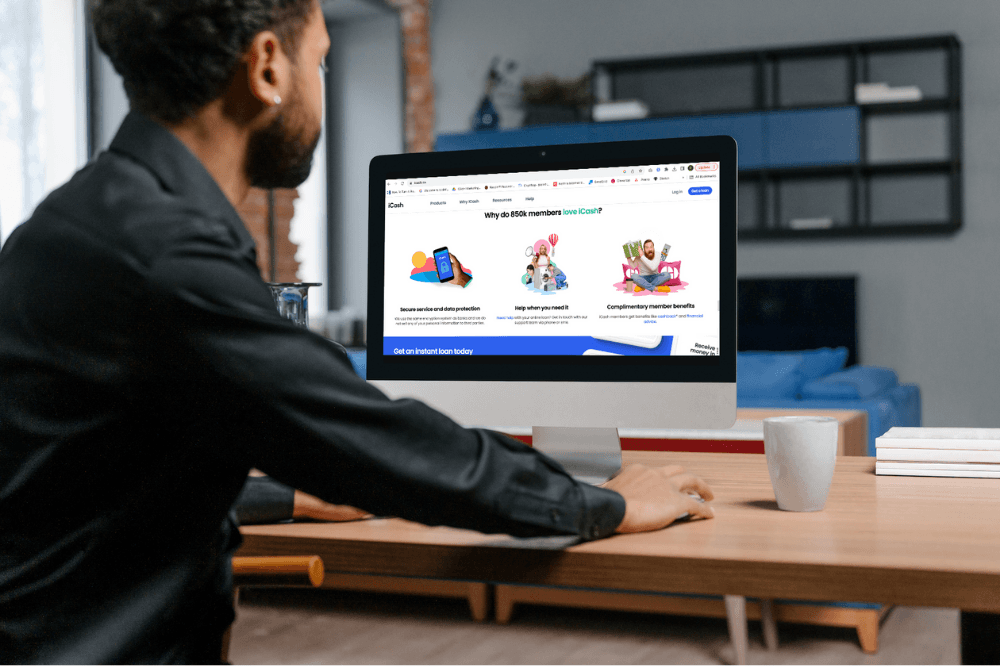Over the years, iCash has been proud to help over 850,000 Canadians find financial relief with instant payday loans in moments when they needed it most. We can proudly say that we’ve revolutionized the lending industry and continue to help Canadians every single day!
However, alongside these achievements comes the unfortunate misuse of our brand by fraudsters seeking to exploit hard-working Canadians. That’s why we’ve written this blog, to equip you, our cherished customer, with the knowledge and tools to recognize and avoid potential threats and experience online safety. An informed user is an empowered user, and by knowing the signs of fraudulent activity, you can protect yourself and ensure a secure digital experience.
Types of Scams Using iCash's Name
As iCash continues to grow, so does the unfortunate misuse of our brand by individuals seeking to deceive innocent Canadians. That’s why it's essential to familiarize yourself with online safety and the various types of scams involving the misuse of our name, allowing you to spot suspicious activity right away and protect yourself from potential harm.
Phishing Attempts
In phishing, scammers attempt to trick individuals into divulging sensitive data, such as passwords and financial information. They may send emails or messages purporting to be from iCash, asking for your login credentials or clicking on malicious links. To be clear, you will never receive unsolicited communication from iCash asking for sensitive information. Additionally, official iCash emails will end with @icash.ca. However, scammers may use email addresses ending in @gmail.com or @outlook.com.
Impersonation on Social Media
Unfortunately, this is one that happens all too often, which is why we ask everyone to be as vigilant as possible. Fraudsters often create fake iCash profiles on social media platforms, mimicking our official accounts. They’ll use some sort of variation of our username, by adding extra letters, or spaces. But to be clear, these are our ONLY official social media accounts:
Fake pages may post enticing offers, promotions, or false announcements, luring users into sharing personal data or making transactions with malicious intent. If we’re running a contest, it’s also possible they may send you a DM, claiming you are a winner. This is why it’s so crucial to ensure any message you receive is coming from a legitimate iCash account.
False Website Pages
Sometimes, scammers may create fake website pages falsely claiming affiliations with iCash. These fraudulent pages are designed to manipulate users into providing their personal information, making payments, or installing harmful software on their devices. Always double-check the legitimacy of websites and verify offers through official iCash channels only.
Being aware of these scams and understanding how scammers operate is the first step in protecting yourself and maintaining a secure online safety presence.
Red Flags to Look For
Identifying red flags associated with potential scams is crucial to protecting yourself from deceptive attempts. Staying one step ahead of scammers and maintaining a secure online safety presence can be achieved by being aware of these warning signs, which are (usually) easy to spot.
They make it seem extremely urgent: Scammers often try to make it seem as urgent as possible, almost as if it's a life-or-death situation. They may even become extremely irate if you do not demonstrate the same urgency. The iCash team will always treat you with respect. If you aren’t receiving that from someone claiming to be part of our team, that’s a big red flag.
The text contains spelling errors: Pay close attention to the language used in communications. Scammers often make spelling and grammatical errors in their messages. Legitimate communications from iCash undergo a thorough review and are unlikely to contain noticeable language mistakes.
They ask for personal information: Simply put, we will never ask you for personal information over social media platforms. If you receive a message from a supposed iCash employee on Instagram or Facebook, asking for information like your card numbers, date of birth, SSN, etc. then that is a massive red flag.
They cannot answer simple questions: Firstly, we recommend never engaging with potential scammers. However, if you find yourself in a situation where you’ve already started speaking to them, try asking them some very basic questions about their legitimacy. You’ll find that even basic questions, like asking them how iCash loans work or how they got your information, will trip them up fairly quickly. That’s another major red flag.
How iCash Protects Your Data
We follow important privacy laws like the federal PIPEDA (Personal Information Protection and Electronic Documentation Act), Québec's new Privacy Law 25, and provincial privacy laws if they amend federal rules and apply to the private sector. These laws make sure we keep a close eye on security and respond well to any problems. Our top priority is your online safety and making sure your data is 100% secure.
To keep data safe, we use special ways to encode it when it's stored, when it's moving, and when it's being used. Our systems are protected by cutting-edge Web Application Firewalls that actively mitigate zero-day vulnerabilities and respond to DDoS attacks, ensuring your information is shielded with the highest level of security. We're always working to make sure customer data is safe and we take this responsibility seriously.
General Tips to Protect Yourself
Empowering yourself with knowledge and adopting safe online practices is essential in the digital age. Here are effective tips to help you protect yourself from potential scams in general:
Verify the Source
Utilize and trust only iCash's official website, verified social media accounts, and officially provided contact information for any transactions, inquiries, or communication. Before entering any personal information, double-check the website's URL to ensure it matches iCash's official domain (https://icash.ca/).
Be Cautious with Personal Information
Avoid sharing sensitive information like passwords, credit card details, or Social Security numbers through unsolicited calls, emails, or messages, even if they claim to be from legitimate sources. And if you do have to share personal information, ensure you're on a secure and encrypted connection, (look for "https://" and a padlock icon in the address bar).
Educate Yourself on Common Scams
Get familiar with common phishing and scam tactics used online. Knowing what to look for will help you identify potential scams and protect yourself from falling victim. It also helps to keep your devices and security software up to date to ensure you have the latest protection against online threats and scams.
Avoid Clicking Suspicious Links
Lastly, refrain from clicking on links or downloading attachments from unknown or suspicious sources, especially if they are not from verified channels. If you download any attachment from an unknown source, you may open yourself up to a computer virus.
Report Suspicious Activity to iCash
If you encounter any suspicious activity or potential scams involving iCash, please report them to iCash directly. You can Inform fellow iCash users about your experiences to raise awareness and help others recognize potential scams too. Overall, by implementing these tips and staying vigilant, you'll create a safer online environment for yourself and contribute to the overall security of the iCash community.












